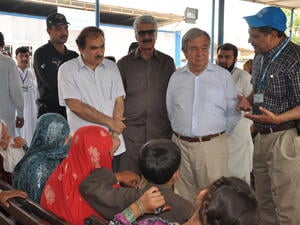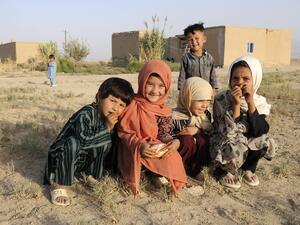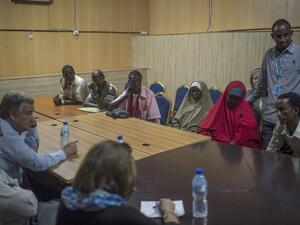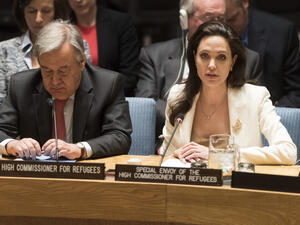UNHCR chief Guterres calls for end to North Kivu fighting
UNHCR chief Guterres calls for end to North Kivu fighting
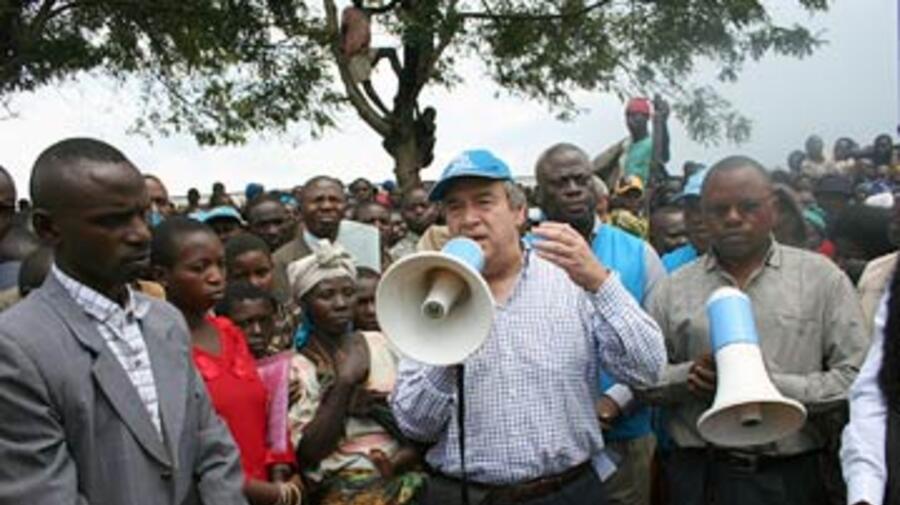
High Commissioner Guterres offers support and understanding to displaced people in North Kivu.
GOMA, Democratic Republic of the Congo (UNHCR) - UN High Commissioner for Refugees António Guterres has called for an end to the fighting in eastern Democratic Republic of the Congo (DRC) and pledged to help improve conditions in camps there for tens of thousands of displaced people. Guterres, wrapping up a three-day visit to DRC's strife-torn North Kivu province on Sunday, said the real solution to the massive displacement lay in lasting peace.
Since August this year, an estimated 170,000 people have been forced out of their homes in North Kivu by fighting between government troops and rebels allied to dissident army general, Laurent Nkunda. Many people have found shelter in camps west of the provincial capital, Goma, as well as some 70 kilometres to the north, around the town of Rutshuru. Guterres visited both areas.
"UNHCR and other partners will do our best to improve conditions in these camps. But we do not want camps to be a permanent residence for you. It is never good to live in camps," Guterres told hundreds of internally displaced people (IDPs) gathered Saturday in an improvised community centre in Kisasa, one of several camps in or around Rutshuru.
On Friday, hundreds of displaced people lined rain-soaked roads to welcome the top UN refugee official on his first visit to Buhimba, an IDP camp set up by UNHCR on the outskirts of Goma. Buhimba is one of five IDP sites hosting more than 40,000 displaced people near Goma.
"We know how much you have suffered. Members of your families have been killed, your homes have been burnt and you have lost your harvest," Guterres told IDPs gathered in a makeshift social hall at the edge of the camp of some 10,000 people.
"I believe your biggest desire is peace and the opportunity to return to your homes. But to gain peace in North Kivu province, fighting must stop," the High Commissioner stressed, adding that he had spoken to the governor of North Kivu and to UN peace-keepers in Goma. "We are all in agreement that fighting must stop."
Over the last year, a mix of conflict, military build-up and spiralling lawlessness has displaced some 400,000 people in North Kivu - the worst displacement since the end of the civil war in 2003. In total, there are an estimated 800,000 displaced people in the province, including those uprooted by previous conflicts.
During his three-day visit to IDP sites near Goma, scores of displaced people told Guterres about their suffering at the hands of armed men in their villages and the harsh life in camps, where they said there was insufficient food, water or plastic sheeting to protect their flimsy shacks.
There were no maternity clinics for pregnant women, no schools for children and no means of livelihood, they said, adding that armed men roamed freely in the camps and harassed people. "We fled from different directions and have found ourselves here [in Buhimba]. But we fear that the same person we fled from is going to follow us here," an elderly man lamented, referring to Nkunda. "Where must we go to be safe? Where is the end for us?"
At a press conference held in Goma on Sunday morning, Guterres said it was unacceptable that armed men were entering IDP camps and called on all sides to respect the civilian character of these sites.
A middle-aged woman in Buhimba camp begged Guterres to help her people return home. "Plead with our leaders to see our suffering. We are tired, we are tired - We plead with you to help us to return home," she cried.
A young man in the packed social hall at Buhimba told how they had fled into the forest to escape forced recruitment by rebels. "But life in the camp is nothing but suffering," he added.
In Kisasa, a camp of some 5,000 IDPs in Rutshuru, a one-eyed woman stepped forward and picked up the microphone. "I was not born with one eye. But the rebels attacked us one night, tied us up and beat us up. They gouged out my eye and raped me," she told a shocked Guterres.
The UNHCR chief toured several other IDP sites, including Rutshuru Primary School. IDPs stack their belongings each morning in one corner to allow pupils to attend lessons in their classrooms; at night, the classrooms become dormitories. Communal kitchens have replaced the school courtyard. Other IDPs have taken over the town's stadium, sleeping on the terraces and cooking on the pitch.
Guterres returned to the Congolese capital, Kinshasa, on Sunday afternoon. He is expected to meet with DRC President Joseph Kabila and senior government ministers on Monday before returning to Geneva in the evening.
By Millicent Mutuli in Goma, Democratic Republic of the Congo


